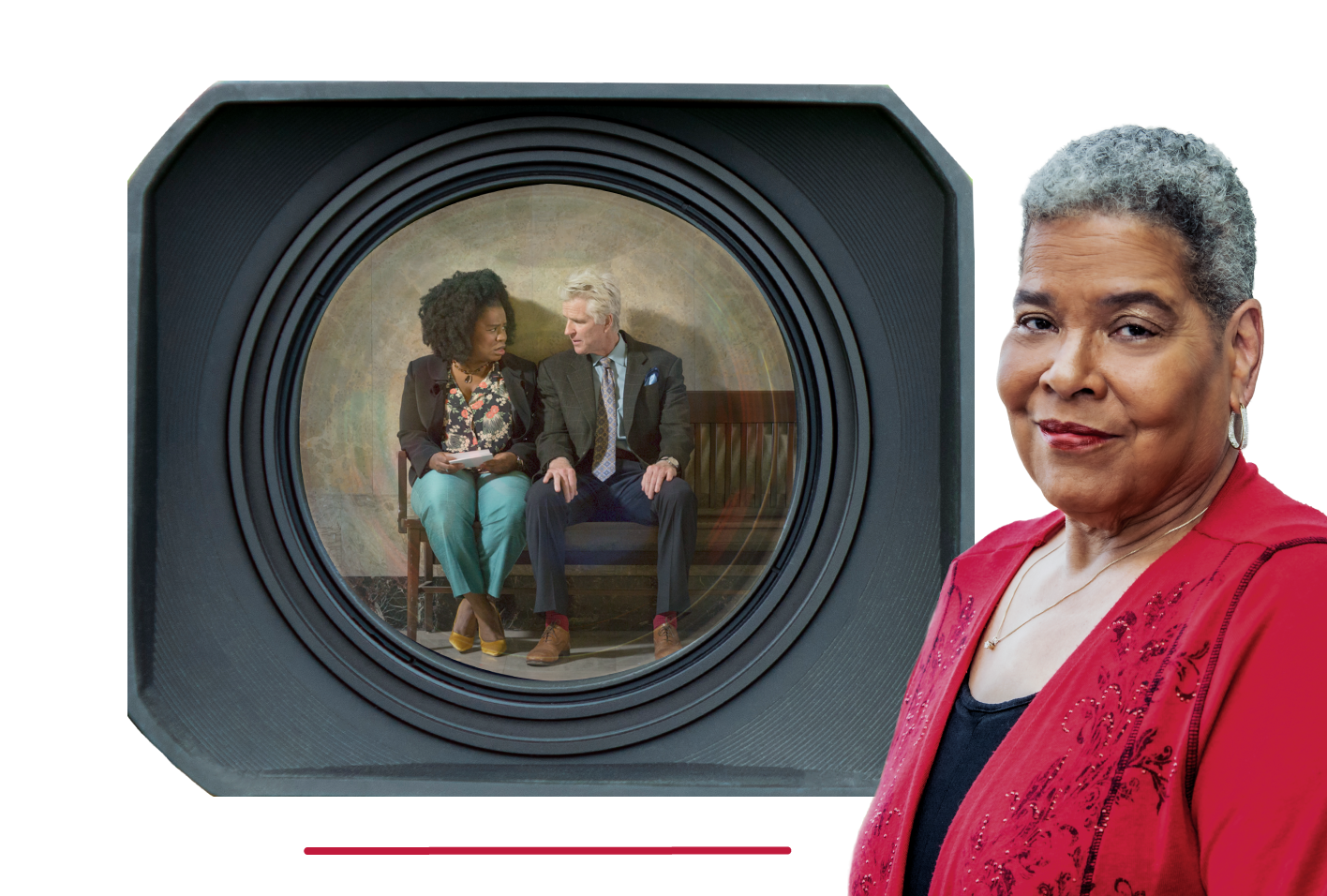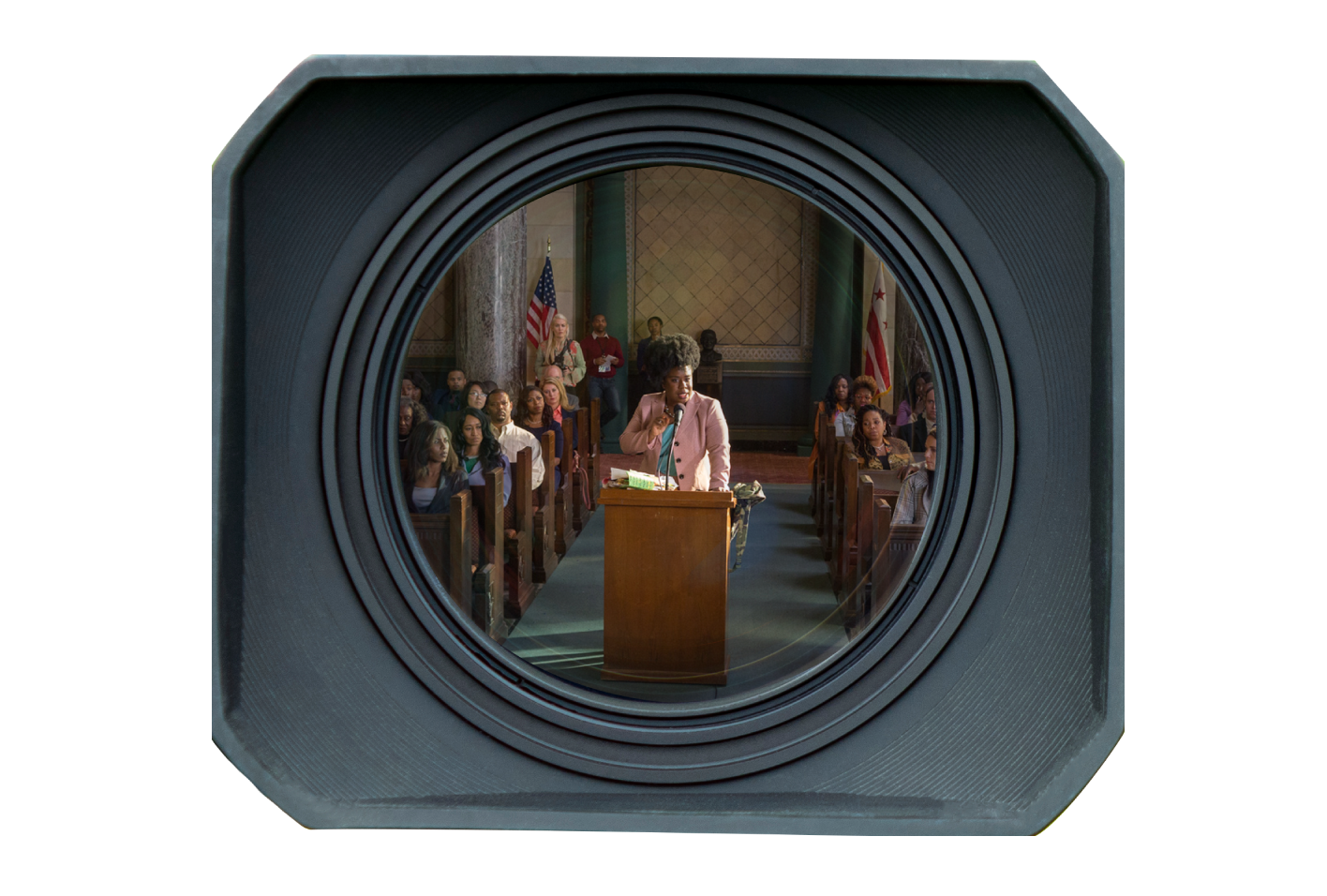Virginia Walden Ford never expected her life to become a movie. All she wanted was to send her boy to a better school. “When I started this journey, it was to fight for my son,” she says. “Along the way it became a fight for all children.”
Ford struggled to help her William after she discovered he was skipping class at his Washington, D.C., high school. He got suspended twice, at a time when drug dealers were loitering on corners in his neighborhood, looking for recruits. If William was going to succeed, or even survive, his mother would have to find a school that inspired him to learn.
So in 1998, Ford banded together with other parents to seek more educational opportunity. They hoped for scholarships their children could use to escape their dysfunctional public schools. “We were a group of low-income and working-class parents,” she explains, possessing one tool: “Our voices.”
Her efforts led to the creation of the D.C. Opportunity Scholarship Program in 2003. It offers per-pupil payments that low-income K-12 students in our nation’s capital can use to cover tuition at private or parochial schools. Now Ford’s story has been turned into a film named after the woman who started it all: Miss Virginia.
Nonprofit filmmaking as a tool for social reform
Miss Virginia was developed by the Moving Picture Institute, a nonprofit film-production house created to “entertain, inspire, and educate audiences with captivating stories about human freedom.” Founded in 2005 and funded solely through philanthropy, MPI gradually built expertise and industry credibility while creating an initial dozen films. With this new high-quality theatrical release, the group is now hitting its stride.
Miss Virginia stars Uzo Aduba, the Emmy-winning actress from Orange is the New Black. The cast also includes Matthew Modine, who recently appeared in the Netflix series Stranger Things, and Emmy-nominated Vanessa Williams. The production quality is excellent.
For a movie filled with scenes of town-hall meetings and conversations with Congressmen, it’s remarkably emotional. William’s character is charming as he grows beyond his disinterest in school, after being exposed to excellent teachers and eager fellow students. A host of supporting characters, from the friend who becomes a victim of gang violence to the mother who supports Ford, make the story personal.
Ford doesn’t set out to become an advocate. Her turning point arrives when she attends a public hearing on education. To pay for her son’s private school, she’s been doing janitorial work in the office of her delegate in Congress—who has assured her, in patronizing conversations amidst the emptying of trash cans, that the only problem with local schools is that they are underfunded. Then at the hearing, parents stand up to express deep concerns about safety, grade inflation, and low expectations in their schools. They grow restive as the politicos at the front of the room palm them off.
Having been instructed to ask a planted question if the meeting begins to go south, Ford gets hustled to the podium. Battling her terror of public speaking, she clutches the index card with her prompt. But the duplicity of the whole charade is too much for her. She shakes her head and takes off her glasses.
“It’s been a long day,” she begins. She has just pulled her son out of his private school, which she can no longer afford. And she knows full well the problem with his old school is not that it lacks funding. “I’m done with this lie about money,” she states.
“They say to us that the schools are bad because they’re poor. And we believe them because we know what poor looks like, right?” But the private school her son has been attending spends just $7,000 a year per student, while the floundering public school he’ll have to return to is allotted $12,000.
What if schools, instead of throwing more money at teachers, actually gave students opportunities to succeed, and high goals? “Just imagine it,” says Ford, “because I know I have.”
What if schools gave parents respect, and options, and hope? “Losing that hope for my son,” states the weary mother, “was the saddest thing in the world.”
Ford says watching Uzo Aduba play her at the crucial public showdown gave her goosebumps. “I remember how scared I was giving my first speech at a similar meeting to what is portrayed in the movie,” she says. “It was terrifying. She really channeled that inner angst I had in that moment.” “We were a group of low-income and working-class parents who possessed one tool: Our voices.”
It’s the first point in the film where Ford realizes she’ll have to take her son’s success into her own hands. From that moment on, Miss Virginia picks up speed. Before long, the shy, weary mother is searching Washington for anyone who will listen to her, and she won’t take “no” for an answer.
Even after Ford meets a Congressman who appears willing to help, he warns her that the mission is next to impossible. “In D.C., you need an act of Congress. That means you need to get the attention of a bunch of politicians who don’t care about you because you didn’t elect them. And then you’ve got to get them all to agree, which happens: Never. And then you need the President to sign it into law. You have a better chance of winning the lottery than getting all of that done,” he says.
“No wonder why nothing changes around here,” she responds. “Until now.”
Ford refuses to surrender, and at last the Congressman concludes: “You might just be formidable.”
From real-life heroine to silver-screen superwoman
As her true-life alliance with former House Speaker John Boehner and other school reformers gradually gathered support, Ford became a target. Defenders of the educational status quo said she was just a mouthpiece for others. “So many people accused me of not only being paid but being coached on what to say and how to say it. I got called names by those opposing the scholarship program.”
“It was painful hearing such mean, nasty things said about me,” admits Ford. Yet “the parents I was fighting alongside believed me and trusted me. They knew that my intentions were genuine, and that I would never let them down or hurt them and their children.” The parents and their allies in Congress battled through a gauntlet of legislative obstacles, and in 2003 the D.C. Opportunity Scholarship Program finally passed—by a single vote—and was signed by President George W. Bush in January 2004.
Ford’s quiet passion is what inspired Erin O’Connor to write the script for Miss Virginia. She came to the task with 30 years of experience teaching at various levels. “I’ve seen firsthand the life-changing things that can happen when a struggling kid gets the chance to attend a good, safe school,” she says. “So, when I met Virginia and the families her work has affected, I felt an immediate, visceral connection.”
“I got to know Virginia very well. I didn’t just see the public figure, the warrior—I saw the driven, complex, intensely private woman who found herself leading a massive movement because that was the only way forward,” O’Connor says. “I learned from her why she did it and what kept her going and how hard it was. Over time I developed a very clear idea about how best to translate Virginia’s story to screen.”
This film fulfills one of MPI’s missions: to tell captivating stories about human freedom. “To craft moving, unforgettable stories that bring people together to solve the worst, most intractable problems we face as a society,” O’Connor asserts, is a thrilling vocation. “Education is one such problem. But there are many, many others. Great stories can lift us up with a shared, common purpose that transcends political gamesmanship and partisan warfare. We desperately need that as a nation.”
This storytelling vision, however, requires one essential ingredient or it will never come to life: Money. High-quality films are not cheap. And this particular movie would never have gotten off the ground if it weren’t for philanthropic sponsors. Even under MPI’s careful nonprofit budgeting, Miss Virginia’s development, scripting, filming, editing, and production cost about $4 million. And then there are all the costs of getting the film into theaters and the minds of potential viewers.
“Independent films often spend more on marketing and distribution than on production,” explains Rob Pfaltzgraff, the president of MPI. “In order to maximize Miss Virginia’s reach and overall impact, our goal is to match our production investment” with an equivalent investment in efforts to inject the film, and its real-life story, into the popular imagination and national discourse.
Virginia Walden Ford (right) says watching Uzo Aduba play her in “Miss Virginia” gave her goodbumps. In the film image, the actress is seated with Matthew Modine, who plays a John Boehner-like Congressman.
Savvy donors step up to boost storytelling
Kim Dennis, president of the Searle Freedom Trust, says her foundation has decided to help with both parts of the process. The trust donated an initial $250,000 to boost production of Miss Virginia, then $250,000 more after she screened the final cut.
“Once we saw the completed film and saw how good it is, and realized how much potential it has to spread the message about the need to reform the educational system, it seemed a no-brainer to help promote it,” she says. “We think the film will resonate with audiences that the typical think-tank study doesn’t reach.”
Getting involved with Miss Virginia has been something of a watershed moment for the Searle Freedom Trust. In the past it has donated to other artistic and storytelling projects aimed at bringing fresh ideas on education, markets, and freedom to the public. But it has often struggled to spot results from those efforts.
Often, “the talent just didn’t exist,” says Dennis. “We started investing in this sort of thing in 2007. And I think it’s only now, with Miss Virginia, that we are seeing significant payoffs.”
Dennis says the trust decided to take a chance on Miss Virginia because “we mostly support very wonky policy research, and those ideas don’t resonate with the general public very well. There’s a lot of graphs and charts and numbers,” she notes. “We see the importance of humanizing important ideas, showing why free markets and more individual responsibility and less government control really help people, including those who most need help. We want to show how policies of more individual freedom and less government intrusion in our lives actually benefit individuals. Miss Virginia does a really good job of that.”
The Searle Freedom Trust hosted an early screening of the film with about two dozen people this summer. Dennis admits that when she showed up, she was worried. “I confess, we were a bit nervous about it,” she says. When the lights came back up, though, “we were pretty blown away. I’m not sure there was a dry eye in the crowd. At the end, everyone just spontaneously jumped up and gave it a standing ovation. I think everyone felt the same way: It was better than any of us hoped it would be.”
Ford, who was at the screening, said seeing her story come to life was “surreal.” Dennis believes her continuing involvement will be essential to the success of the film. “You can see why she became the leader in this effort. She’s very articulate and can explain how these school-choice efforts help.”
“It’s useful when there’s a real person attached to a watershed event, someone who can speak so effectively,” Dennis adds. “I guess our reaction to the first showing was both that the film is even better than we expected, and that Virginia’s involvement in promoting it could be very, very important. She’s a great messenger.”
Other donors crucial in catalyzing this project include the Gleason Family Foundation. Its president, Tracy Gleason, says the group got involved for many of the same reasons cited by Dennis. “I came to realize that statistics and facts alone could not reach most people on the subject of their child’s education.”
Gleason is concerned that “people are constantly surrounded by carefully crafted messaging telling them that failing schools will just take more time and more money to fix and to leave it up to the educators and politicians who know best. Parents are just supposed to sit on their hands and take what they are given.”
But “Virginia’s story is an emotional way to convey the disingenuousness of those false claims,” she says. “And to show that the strength, conviction, and love of even just one engaged parent can overcome high obstacles. I knew that Virginia’s story told through the realism and drama of film would be empowering and eye-opening.”
Lori Armistead, senior program officer at the Walton Family Foundation, says she was interested in the story because she has been friends with Ford since 2003. “Virginia’s story is emblematic of the countless warriors throughout this country committed to expanding educational opportunities. She has never sought the spotlight, but the spotlight found her, because her gentle and tireless work opened floodgates for so many children. Her story is as inspiring as it is real.”
Armistead hopes the tale will produce many ripples. “If encountering this film emboldens other parents struggling to find the right environment for their child, or struggling to find the courage to demand change, that will speed the emergence of another generation of Virginia Walden Fords.”
“Our partnership with MPI has been mutually beneficial,” adds Armistead. “They have produced a great film. And now Walton is helping them connect with education champions at the local and national levels to help spread word of this inspiring story far and wide.”
“This film empowers other parents to be advocates,” says Diana Spencer of the Diana Davis Spencer Foundation. “It sparks hope. Miss Virginia sets a high standard and is changing the education paradigm of ‘one size fits all.’ Parents can make a difference in their child’s future.”
Ford “has never sought the spotlight, but the spotlight found her,” notes Lori Armistead of the Walton Family Foundation. Here, the film depicts one of the first times Ford ever spoke in public.
The crucial need for a social-impact campaign
When the film is out, MPI’s goal is to shift toward publicizing it with energy and cleverness. It has enlisted the help of other organizations with deep experience in advocacy, hoping to build a marketing and education campaign that will bring Miss Virginia to every state of the union. John Kramer, vice president for communications at the Institute for Justice, is one of the main advisers. His public-interest law firm decided to get involved because it had helped Ford for many years during her fights for education reform.
The Institute for Justice is organizing grassroots and leadership screenings in cities where the film’s message has special resonance. Its goal is to get the movie into key communities “as a vehicle to inform and inspire parents that education reform can succeed, if they stand up, join together, and make it happen,” says Kramer.
“The most effective voices for expanded schooling options are parents who were themselves failed by the educational establishment, and whose children are being failed by those same forces today,” he states. “When these parents watch Miss Virginia, I suspect they will see themselves on the screen, and be inspired to follow Virginia’s lead—to fight against the odds, to confront the establishment, and secure a better education for their children and other kids in their communities who desperately need access to a quality education.”To cement into the minds of Americans the lessons that Ford learned the hard way, donors are working with the filmmaker to create a grassroots publicity campaign.
Urban families are hungry for better schooling alternatives, says Kramer. They just need options. “All the variations on the theme of educational choice are designed to provide parents with opportunities to get their kids into good schools today.”
The last generation made tremendous progress in this area, but the movement for expanded schooling options is now encountering renewed opposition. Mobilizing parents to demand choices is once again necessary.
MPI President Rob Pfaltzgraff wants his film’s message to linger in viewers’ minds long after they walk out of the theater. MPI’s partnership with other nonprofits and philanthropists to publicize Miss Virginia through special screenings in churches, neighborhood living rooms, and community centers is the best way to make sure the movie produces lasting effects. “We’ve always known that releasing the film was just the beginning,” he says. “That’s why our team is now working to realize the ultimate goal of the film—to bring Miss Virginia’s inspirational message to urban parents who feel dispirited, demoralized, and trapped.”
He believes “this film will take them on a journey of empowerment, inspire them with the example of Virginia’s strength, and equip them to demand real change. We are now creating a post-release social-impact campaign.” That campaign is designed to cement the lessons that Ford learned the hard way into the minds of thousands of other Americans.
In November, MPI will launch a grassroots community screening tour. The organization hopes to continue community screenings through the fall of 2020. Donors have already provided funds for a basic pre-release marketing and public-relations effort.
“If we can find partners, we would like to scale the number of local advocacy screenings into the hundreds, and to continue to invest in advertising for the general public after the initial release,” reports Pfaltzgraff.
One thing is clear: the more urban parents, activists, and education reformers who take in Miss Virginia, the more powerful it becomes as a tool to spark change.
“I want people to be inspired,” says Ford in her calm, honeyed way. “And to remember that one voice can truly make a difference.”
Read the Washington Examiner‘s piece on Miss Virginia, inspired by this feature here.


